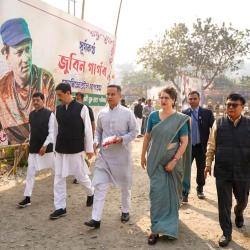Altruism has been reported among bacterial population and among humans and other animals, like monkeys, and elephants. But in mammalian cells at the cellular level the idea of altruism has never been described before. Fortunately Mr Bikul Das an Indian (Assamese) scientist who is doing his research at Stanford University School of Medicine has just found that altruism is far more common in Homo sapiens, and goes right down to our cells. Cancer cell is considered as a disease of cellular evolution to reach a state of self sufficiency and immortality. The final stage of these evolution is the appearance of aggressive and metastatic cancer cells. These aggressive cancer cells exhibit some molecular and cellular features of embryonic stem cells. A research paper by Mr Das has been published in leading international journal “Stem Cells” (June, 2012) revealed that human embryonic stem cells under duress produce molecules that not only benefit themselves but also help nearby cells survive.
It is thought that this find will open a door for a better understanding of hESC (Human Embryonic Stem Cell) altruism could provide new insights into cancer therapies, as well as enhancing researches of other scientists.
While altruism is generally thought of as a virtue, it can have a downside for human embryonic stem cells (hESC): the altruistic cells appear to be more prone to accumulating mutations, a sign that could lead to cancers. When asked how idea to research in this particular subject came to his mind and how it materialized Mr Das said that he saw his father suffering from esophageal cancer when he was about to start his post-graduate training in AIIMS, New Delhi. His father asked him about the disease and he was unsatisfied with because there were no answer to some problems. His father died without cure. Mr Das decided to further expand his own idea on cell growth and cancer, and do research on cancer. So he started thinking on his own ideas on cell growth, about why some cells grow out of control to become cancerous cells. “During my PhD and fellowship training in Toronto (Hospital for Sick Children), I found that exposure of cancer cells to oxidative stress could induce embryonic stem cells like state (the stemness state) to cancer cells. This oxidative stress-induced stem cell like cancer cell state (cancer stemness state) is aggressive, and highly fluctuating (unstable) unlike the normal stemness state, which is stable and less fluctuating’ Mr Das who hails from Sualkuchi, Kamrup district in Assam, said.
It is to be recalled that Bikul Das never let down his sprit and idear despite many troubles he had faced. The scientist had first discussed the idea at a conference in Milan (Italy) in2005. But the experts laughed it off since had no model to demonstrate the transformation. According to Mr Das, altruism is not so easy to demonstrate. He needed hardcore evidence to convince other scientists. So he had to work on the subject with specialist Dr Herman Yeger at the Hospital for Sick Children in Toronto. He got help from Dr Rika Tsuchida (an assistant professor at Tokyo Medical and Dental Hospital) and a few students, Reza Mokhtari, Micky Tsui and Samim Lofti. Dr Peter W Andrews (hails from UK) , considered one of the two authorities of embryonic stem cell research is informed about the progress and has already congratulated Das on his success. After completion of MBBS he served in neighbouring country Bhutan under Ministry of Health and participated in a WHO training course on Tuberculosis control. In 2000 while he was in India on a break and working on a book on antioxidants and that was the time of the idea struck him strongly. “There I had proposed the idea of ‘cytoprotection’ –how cells protect themselves from free radicals, hypoxia and radiation through molecular mechanisms. But it took me 12 years to come up with a cell model to demonstrate altruism at the cellular level”- he said.
According to Mr Das one possible explanation of why cancer cell switch to an embryonic stem cell like state is that there are two kinds of stem cell states: stable state (life supporting) and an unstable state of aggression (life-destroying). Cancer cell may evolve into unstable state of stemness state.v When asked the other prospects of stem cell research with the help of altruism or altruistic cells he said -" Great promise, we just identified the stem cell type. We are now going to study the basic architecture of stemness. The question is what really define the identity of these cells. It is not genetics, because they share the same genes with other cells. It is, we beleived the EPIGENTICs, a fast emerging field."
Now he is preparing to study the redox state of altruistic and cancer stem cells. The redox state is the fine balance of free-radicals and antioxidant in the mitochondria of stem cells and cancer stem cells where these cells turned off oxygen-metabolism but turned-on the anaerobic metabolism (glyclolysis).
By Chandan Kumar Duworah.
- 21818 reads










Add new comment